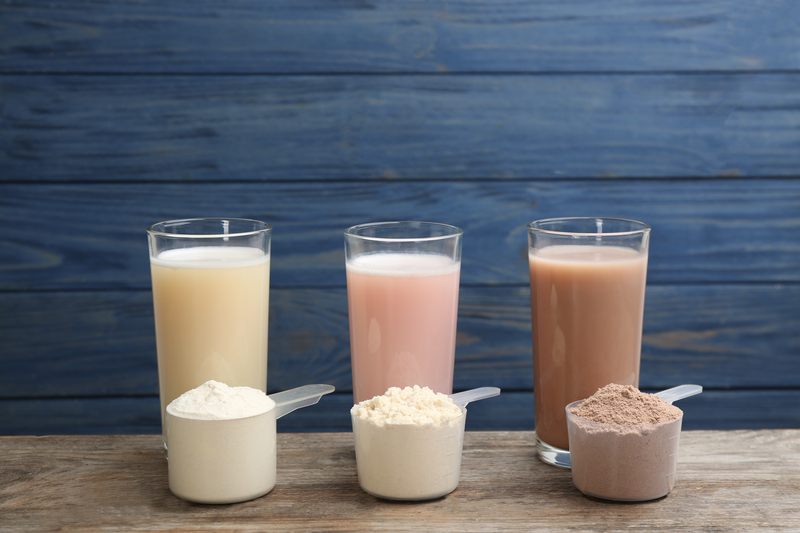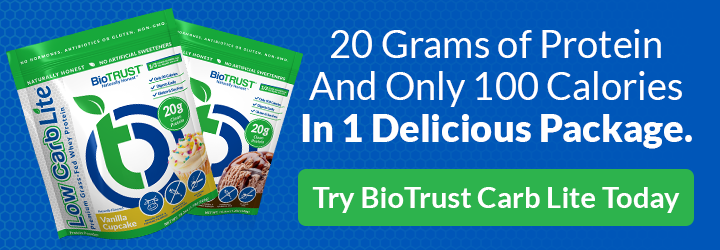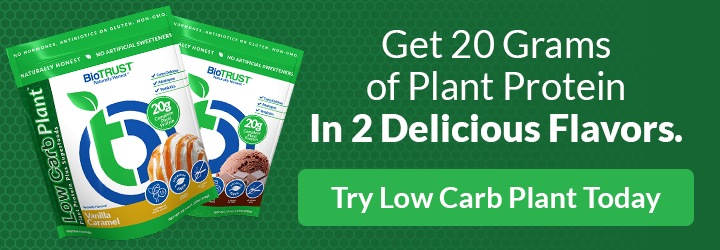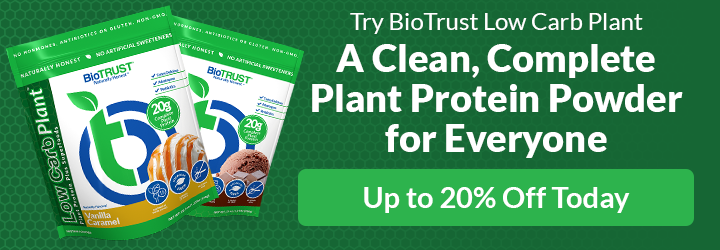Whey Protein vs. Plant-Based Proteins: Which Is Best for You?

When it comes to supplementation, nothing rivals protein powders. They’re convenient, can be tasty (depending on the brand), and easy ways to get more protein into your diet. They also allow you to fuel up on the run, without resorting to less-than-healthy fast-food options. Because of their growing popularity, there are many options available. Some of the most popular types of protein powders include whey protein and plant-based protein. Now, you may be asking if one type is superior or if there’s one that better fits your needs.
Here are some of the most important considerations to determine if whey proteins vs. plant-based proteins are right for you.
Why Protein?
Protein is found in virtually all tissues throughout the body, including muscle, bone, skin, and hair. It’s a building block for the enzymes needed to turn on the chemical reactions for the body to function properly. It’s even necessary for blood hemoglobin, which provides oxygen to tissues. In fact, there are an astounding 10,000 proteins in the body.
Protein is made of basic building blocks called amino acids. There are some the body makes itself and others that must be consumed via food. Those the body can’t make are known as the essential amino acids and include:
- Histidine
- Isoleucine
- Leucine
- Lysine
- Methionine
- Phenylalanine
- Threonine
- Tryptophan
- And valine.
There are big benefits to increasing the amount of protein in your diet, including muscle growth and repair, maintaining healthy bodily functions, weight loss and maintenance, healthy metabolism, and much more. In other words, protein is not only an important macronutrient, but it’s also essential.
The Benefits of Protein Powders
In our busy lives, it’s not always easy to get the protein we need to power our bodies. That’s why everyone from aspiring athletes to fitness enthusiasts to folks seeking to manage their weight to those who are interested in extending their life and health span are interested in increasing protein intake.
There are numerous choices when it comes to protein powders and good questions to ask when making your choices. One of the most common, however, is whey protein vs. plant-based proteins: which one is right for me?
I know we sometimes sound like a broken record, but the honest answer is: it depends. Sometimes whey provides more benefits. Other times, plant-based proteins win the day. It all depends on you, your goals, and your personal preferences.
That said, not all protein powders are created equal. And there are important differences to note in quality, formulation, manufacturing, flavor, and more. Let’s start by breaking down the key differences between whey and plant-based proteins.
What is Whey Protein?
Little Miss Muffet had the right idea when she sat down to eat her curds and whey. Milk protein is made up of two main types of protein: whey and casein. Whey is the liquid, which makes up about 20% of milk proteins. Casein makes up the remaining 80% and is the “curd” when making cheese.
Within whey protein, you’ll find five major proteins, such as β-lactoglobulin, α-lactalbumin, and glycomacropeptide, along with other lesser-known proteins like lactoferrin. In addition to providing vital protein, whey protein provides other benefits, such as:
- Helping support immune functioning
- Promoting an improved mood
- Memory support
- Stress management
- Increased morning alertness
- And more!
What are Plant-Based Proteins?
As stated in the name, plant-based proteins are those that are isolated only from plants. Common plant protein powders use:
- Soy
- Pea
- Rice
- Hemp
- Pumpkin seed
- Lentils
- Oat bran
- Amaranth
- Quinoa
- Buckwheat
- Millet
- Chia seed
- Sunflower seed
- Alfalfa
- Spirulina
While many products contain soy protein as it is a protein-rich plant that provides a complete protein (i.e., it contains all of the essential amino acids), there are concerns with this type of protein. For instance, it contains phytoestrogens, which may interfere with the body’s estrogen and testosterone levels. It also contains goitrogen, which may influence the thyroid, and trypsin inhibitors, which may reduce the activity of important digestive enzymes. Worst of all, almost all soy protein products are ultra-processed and genetically modified (or GMO). In addition, when compared to whey, soy proteins have been found to underperform in terms of fat loss, muscle gains, strength gains, and appetite management.
Corn may also be another problematic ingredient included in many plant-based proteins as it’s often made with GMO ingredients. There are arguments for and against using GMO ingredients. Unfortunately, often with GMO plants, more chemicals are used in the growing process. Often, this results in higher levels of the herbicide glyphosate and pesticide residues that many of us prefer to limit or avoid altogether.
Plant-based proteins that are predominantly made from rice protein may also have high levels of heavy metals, including lead and arsenic, which may lead to health issues when consumed regularly or in large quantities.
One of the biggest issues for some consumers of plant-based proteins is the texture and mixability. While there are people who prefer the slightly grainer texture (really!), others find it off-putting.
Benefits of Whey Protein
When comparing protein sources, quality is one of the most important considerations. For instance, which protein provides a better amino acid balance, which is easier to digest, and which provides greater availability of amino acids?
In terms of quality, whey protein is often the undisputed king. Whey, after all, provides the most concentrated source of all essential amino acids. Plant proteins, on the other hand, are often limited in terms of essential amino acids. Rice and hemp protein powders, for instance, are low in lysine, an essential amino acid. Pea protein is naturally low in methionine and cysteine.
Whey is also highest in the branched-chain amino acids (BCAAs), which are vital to protein metabolism, neural function, and carbohydrate regulation. Leucine, in particular, is important for muscle growth and recovery, strength gains, and enhanced muscle function. Whey provides about 12% while plant proteins provide a mere 6 to 8%.
Whey also comes out on top in the protein digestibility corrected amino acid score (PDCAAS) and the digestible indispensable amino acid score (DIAAS). For instance, whey comes in at 1.09 for DIAAS vs. 0.82 for pea protein and 0.37 for rice protein. A look at PDCAAS provides similar ratings with whey protein isolate scoring 100% vs. pea’s 89% and rice’s 42%. Whey (and other animal-based protein powders) are also higher in protein density with a lower calorie count per gram of protein than plant-based proteins.
It’s not important to remember these ratings or scores. Rather, what’s important to understand is that whey protein tops the quality scale in terms of how easily it’s digested and absorbed.
Benefits of Plant-Based Protein
While whey protein is still considered the “king” of proteins, there are good reasons to opt for plant-based proteins as well. For instance,
- They’re animal free. If you choose to avoid animal products for environmental, ethical, religious, or health reasons, it is possible to get the nutrients you need from a plant-based diet. Even if you aren’t strictly vegan (e.g., your diet is vegetarian or flexitarian), you can stick to a mostly plant-based diet by consuming plant-based proteins.
- They’re dairy free for people who are sensitive or intolerant of milk proteins or sugars (i.e., lactose) or for people who are following diets that restrict dairy products, such as Paleo and elimination diets.
- They’re often easier to digest for people who are sensitive to FODMAPs.
- They’re free of antibiotics, growth hormones, and other medications that may be routinely administered to dairy cows.
- They’re higher in some essential amino acids, such as glycine and arginine, which are important for enhanced relaxation, stress management, and healthy muscle function. Glycine is also important for producing creatine and collagen in the body, which have important roles in health.
- Meat and dairy production require more resources like water, land, and power than plant-based protein. So, sustainability and affordability are big reasons to include more plant-based proteins in the diet.
Plant-Based Protein Problems and Solutions
Knowing the potential shortcomings of various plant-based protein ingredients can help overcome those issues. For instance, to overcome the missing amino acids in some plant proteins, you can combine plant foods for a complete protein. For example, rice and hemp proteins provide limited amounts of lysine. Fortunately, pea protein contains more lysine, but it provides lower amounts of methionine and cysteine, two other essential amino acids. In addition, you may need to eat more plant-based protein sources to get sufficient levels of quality amino acids.
Because the digestibility of plant-based proteins can also be an issue, adding enzymes to help digest the proteins (e.g., proteases or alpha-galactosidase) may help improve the digestibility and the bioavailability of the amino acids.
Some plant-based protein powders are also fortified with missing amino acids like leucine, lysine, and methionine to help improve overall protein quality. For instance, some brands add fermented leucine to help close the amino acid gap.
Whey vs. Plant Protein Takeaway
If you’re comfortable consuming animal proteins, whey protein is one of the top guns. But if you want to consume more plant-based proteins, you still have some great options, and many people may choose to consume BOTH.
Whey protein digests faster and provides a more rapid release of amino acids, making it a great after-exercise option. Plant-based proteins tend to release more slowly, offering a more sustained protein release. They also mix well into oatmeal and add texture to baked recipes. Just remember to look for a plant-based protein powder that contains a mix of different proteins (e.g., pea, grain, and seed) for a complete protein source. Both types of protein can help support muscle recovery and growth and may help better support weight management.
Whichever proteins you choose, go with a quality, reputable brand and a product that provides at least 20 grams of quality protein per serving and minimal other additives (especially extra sugars or fillers).









